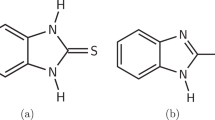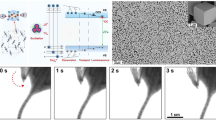Abstract
THE coarse spectrum of copper iodide in the visible region was investigated by Mulliken1 in 1925 and Ritschl2 in 1927. Ritschl recorded five extensive band systems in absorption, all degraded to red in the region 3750–5500 Å. From a study of their vibrational analysis he concluded that all systems have a common lower state which is the ground state of the molecule. This communication reports the results of the rotational analysis of the E–X bands of 63Cu127I.
This is a preview of subscription content, access via your institution
Access options
Subscribe to this journal
Receive 51 print issues and online access
$199.00 per year
only $3.90 per issue
Buy this article
- Purchase on SpringerLink
- Instant access to the full article PDF.
USD 39.95
Prices may be subject to local taxes which are calculated during checkout
Similar content being viewed by others
References
Mulliken, R. S., Phys. Rev., 26, 1 (1925).
Ritschl, R., Z. Physik, 42, 172 (1927).
Singh, R. B., and Tiwari, S. K., Proc. C.S.I.R. Symp., Varanasi, 167 (1963).
Herzberg, G., Spectra of Diatomic Molecules, 168 (D. Van Nostrand Co., Inc., New York, 1950).
Ramakoteswara Rao, P., Asundi, R. K., and Brody, J. K., Canad. J. Phys., 40, 1443 (1962).
Author information
Authors and Affiliations
Rights and permissions
About this article
Cite this article
NAIR, K., UPADHYA, K. E–X Band System of the Copper Iodide Molecule. Nature 211, 1170 (1966). https://doi.org/10.1038/2111170a0
Issue date:
DOI: https://doi.org/10.1038/2111170a0



